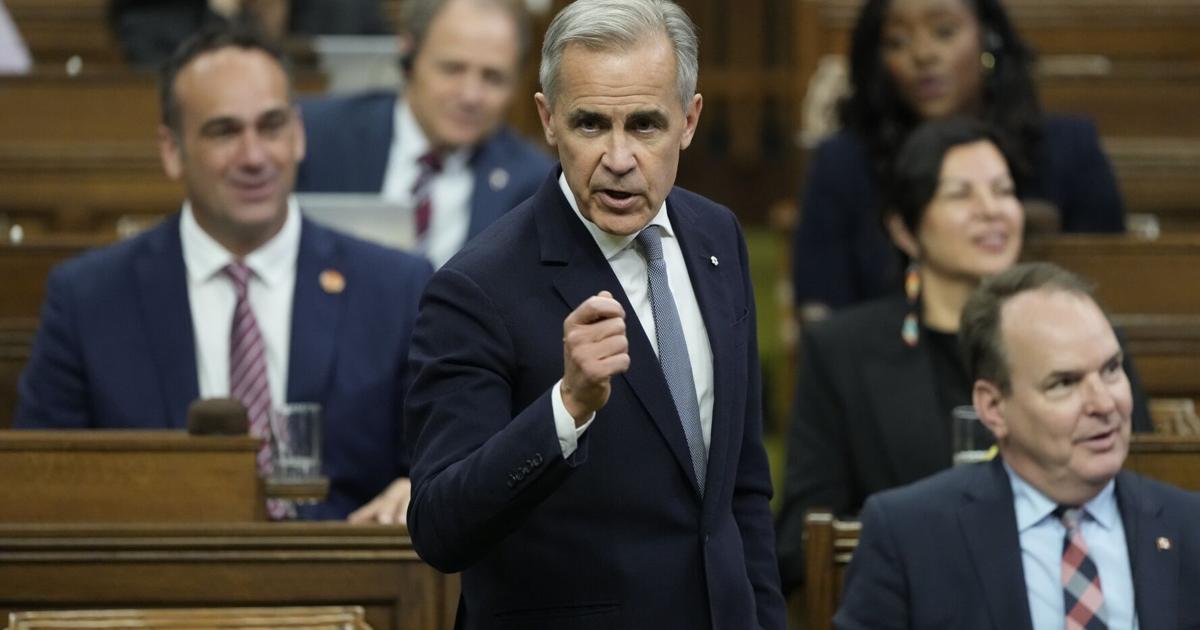OTTAWA—The federal budget will lay out Mark Carney’s long-promised “climate competitiveness” strategy, a plan to “significantly” boost non-U.S. exports over the next decade, and a new immigration plan aimed at drawing international talent, according to a source familiar with a speech the prime minister is to deliver Wednesday evening.
Billed as a live address to the country, Carney’s speech will be delivered before an audience of students at the University of Ottawa, and is expected to cast looming federal spending cuts as the need to make “responsible choices and generational investments,” the source said.
It will also set out his plan for how to make Canada less reliant on the U.S. to buy exported products, another promise that brought Carney to office, as talks intensify over U.S.-imposed tariffs on Canadian steel, aluminum, autos, lumber and much more.
Both are echoes of the Liberal campaign platform which Carney largely rewrote after taking over the leadership from Justin Trudeau.
Carney campaigned on the need to spend less and invest more, and has already ordered a major change in how the country’s books are organized — split into operating funds and capital investment funds — with a vague promise to balance the operating budget within three years, and to borrow over the midterm in order to make major increases to capital spending on defence, ports and railways, and housing.
With Carney in Asia to attend two international summits for about nine days ahead of the Nov. 4 budget, the prime minister is using the speech to preview the budget’s “core principles,” the source said.
The prime minister chose an audience of young people deliberately because it is the generation soon to enter the workforce amid the fallout of global trade uncertainty and economic challenges, the official said.
Hours before the speech, Carney met in private with Conservative Leader Pierre Poilievre after the two sparred in question period in the House of Commons, following an earlier meeting with the Bloc Québécois leader.
Carney is three seats shy of the number of votes he needs to win a majority in the House of Commons, but he can still pass the budget if enough Opposition members either vote with the Liberals, or abstain which could allow the Liberals’ 169 votes to carry the day.
Before they met, Poilievre warned that Carney’s budget plans seem certain to leave Canadians with massive deficits to pay off, as he listed off his own long-standing priorities for the government, and when asked if there was any world in which he might support the budget, Poilievre said, “If he takes my suggestions, bringing down the deficit to the level … the Liberal government promised, of getting rid of the hidden taxes on food, well, then, let’s have a look at it.”
The prime minister, who met NDP interim leader Don Davies earlier in the month, also met Wednesday with Bloc Leader Yves-François Blanchet, who later called Carney “more reasonable” than his ministers, but nevertheless sounded skeptical the Liberals could win his party’s support for the budget.
Blanchet described the meeting as “very cordial” if “perhaps a bit late” even as he teased that it is never too late for the Liberals to meet the Bloc’s “absolute conditions” for support on the budget vote.
Blanchet said he reiterated to Carney the Bloc’s six “non-negotiable” demands, among them increasing health transfers to provinces by six per cent over five years, an expansion of Old Age Security benefits to include those aged 65-74, money for Quebec to compensate for the end of the federal carbon levy in light of Quebec’s retaining its own carbon pricing program, and more help for homebuyers and support for social housing and infrastructure.
Blanchet suggested the Liberals might find support among the “seven independent” MPs who call themselves NDP despite it not having official party status, and the eighth, Green Party MP Elizabeth May.
And he shrugged off any concerns about thrusting Parliament into another election if the budget fails to pass.
“If they wake up a little bit late, it’s once again their problem.”
The Liberals have been in talks to increase funding for some of the Opposition parties, as the Star reported, but all insisted it had nothing to do winning budget support.
Error! Sorry, there was an error processing your request.
There was a problem with the recaptcha. Please try again.
You may unsubscribe at any time. By signing up, you agree to our terms of use and privacy policy. This site is protected by reCAPTCHA and the Google privacy policy and terms of service apply.
Want more of the latest from us? Sign up for more at our newsletter page.



